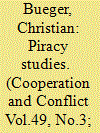| Srl | Item |
| 1 |
ID:
134258


|
|
|
|
|
| Summary/Abstract |
In the last decade maritime piracy has become recognized as a pressing global problem. Together with the problem the new inter-disciplinary project of piracy studies has emerged. In this article I review the state of knowledge and the character of piracy studies. I present two arguments. Firstly, I review recent contributions and suggest that piracy studies is organized in three pillars. The first pillar studies the phenomenon of piratical practice and organization, the second the various organizational responses to it, and the third historicizes and theorizes piracy and the response to it. For each of these pillars I outline future challenges. Secondly, I argue to understand piracy studies, following John Dewey as a ‘community of inquiry’, that is, a community of researchers interested in translating violence and crime at sea into distinct problems that can be mastered. Although researchers rely on different scientific methods as well as divergent problematizations, piracy studies is an inter-disciplinary project that combines abstract and critical stances with immediate practical policy relevance. Far from being a niche project, piracy studies is representative of an innovative mode of knowledge production. Hence, there are larger lessons to be drawn from piracy studies, namely how knowledge generation can be organized to address a contemporary problem.
|
|
|
|
|
|
|
|
|
|
|
|
|
|
|
|
| 2 |
ID:
134569


|
|
|
|
|
| Summary/Abstract |
The article examines the attempt by some academics, think tanks, and policy advisers to discursively link the threat of contemporary maritime piracy with terrorism. While a linkage between certain threats such as the proliferation of weapons of mass destruction, failed states, or money laundering and terrorism has been successful, the effort to connect the notion of maritime piracy and terrorism has failed to reach the discourse of the media and political elite. The article will investigate the arguments made by the proposers of such a linkage and argue that this failure is not so much down to the “real world” absence of a connection between the phenomena, but is made difficult by the romanticized understandings of the “pirate” found embedded in popular cultural narratives and practices. The article will suggest that culturally embedded narratives of piracy found in books and films have greatly shaped our perceptions of contemporary piracy and ultimately influence and limit what we consider plausible in connection to it. In order to illustrate the points made the article will use the example of the piracy narrative in Germany.
|
|
|
|
|
|
|
|
|
|
|
|
|
|
|
|